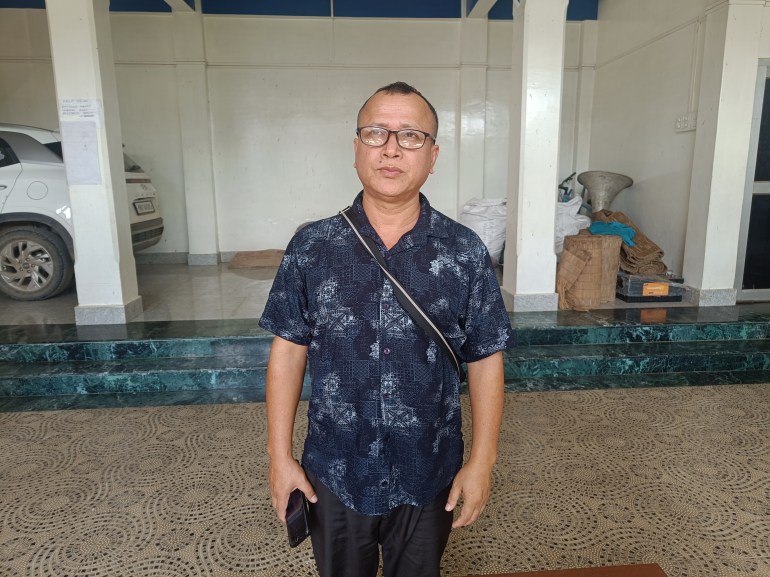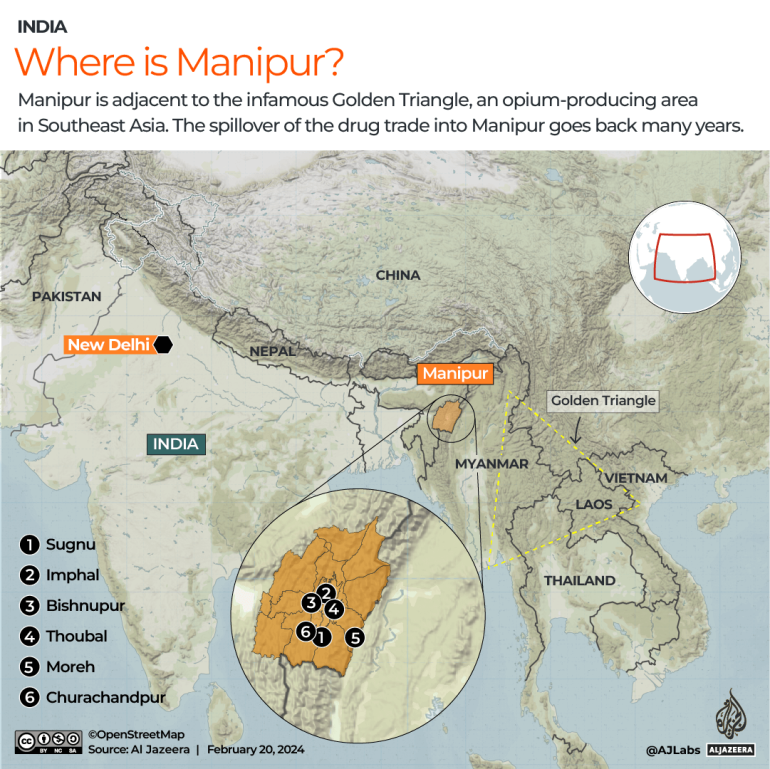Sugnu, India – Ratan Kumar Singh, a 58-year-old high school teacher, never imagined he would be happy to see armed fighters, or “revolutionaries” as he called them. But on May 28 last year, Singh welcomed them to his town of Sugnu in Manipur, a state in India’s northeast corner bordering Myanmar.
For nearly three weeks, the small town had managed to dodge the ethnic violence between the Meitei community and the Kuki-Zo tribespeople that had engulfed the rest of the state since May 3. But that day, four people were killed in the area and 12 injured as bullets found their way from surrounding hilly regions and from a camp dominated by the Kuki-Zo community.
“Then they started burning our houses. Our reinforcements, including the police and our civilian volunteers, started firing back. It was only when the revolutionaries came that we succeeded in overcoming the other side,” Singh told Al Jazeera.
“We were never for gun violence… but when we saw the revolutionaries and other Meitei volunteers come on that day, we cried [out of happiness] because we knew we would be safe.”
The fighters who came to defend Sugnu were, like him, ethnically Meitei.
Eleven months on, the conflict has killed 219 people, injured 1,100, displaced 60,000 and divided the state into ethnic territories. Armed groups have been fighting battles using sophisticated weapons and explosives in rural parts for territorial control even as more than 60,000 armed forces of the federal government and the state have so far failed to bring a durable end to the violence.
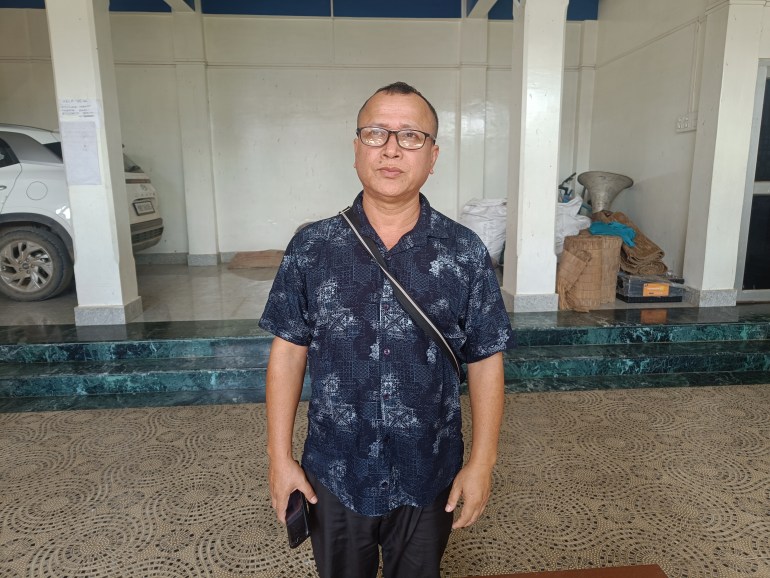
Each episode of violence and killing has punctured the claims of bridging divides that prime minister and right-wing Bharatiya Janata Party (BJP) leader Narendra Modi made during an election rally two years ago when he was campaigning for re-election of his party’s chief minister, N Biren Singh, a Meitei.
“From ‘blockade state’, Manipur is paving the way for international trade. Our government has launched… campaigns to bridge the gaps between the Hill and the Valley,” he said during the rally.
Modi was referring to the historical discrimination felt by tribal communities, including the Kukis, who live on the hillsides and feel that the Meitei community is economically more prosperous than them and are in the majority in the smaller valleys and the capital, Imphal. Modi said Chief Minister Singh’s policies had fostered a more integrated relationship between the hill and valley communities.
It appeared true at the time. In several parts of the hills, the civil society and the rebel groups of the Kuki-Zo community canvassed for Chief Minister Singh, and top politicians of the tribal community lined up for tickets from his party.
Chief Minister Singh swept the elections. In his second tenure beginning 2022, the BJP won five of the 10 state assembly seats from the Kuki-dominated hill constituencies. BJP legislators (MLAs) from these constituencies increased to seven after two of the Kuki MLAs who had won on Janata Dal United tickets defected to the governing party in September 2022. Two out of seven MLAs became ministers in his cabinet.
However, two years later, Modi and Singh’s claims bit dust, with Manipur witnessing unending ethnic violence between the Kuki and Meitei people, arguably, the longest-running ethnic conflict the country has witnessed in the 21st century.
Now, as the state prepares to vote in national elections on April 19 and April 26, those divisions have become entrenched, with a resurgence in armed groups formed along ethnic lines, as the first part of this series showed. It also revealed a presentation by the Assam Rifles that listed several factors that played a role in igniting the conflict: illegal immigrants from Myanmar, the demand for Kukiland, political authoritarianism and ambition of Chief Minister Singh and his war on drugs among others.
A joint force of Police, Forest & MR carried out a Poppy destruction drive at Tora Champhung Hill Range under Ukhrul district.
16 hectares of illicit poppy fields were destroyed, 20 huts burned, and other infrastructures such as pipeline connection, fertilizers, salt,… pic.twitter.com/8S2YE7MiZI
— N.Biren Singh (Modi Ka Parivar) (@NBirenSingh) November 15, 2023
The war on drugs first played a significant role in the political landscape and later in fuelling the conflict in Manipur. This concluding part of the series investigates how the drug trade and politics over it have roiled Manipur.
The war on drugs
In 2018, still in his first term as chief minister, Singh announced his war on drugs.
“Thousands of hectares of land are used for poppy cultivation in areas near the international border with Myanmar,” he told the media.
Poor economic conditions, lack of job opportunities and easy availability of drugs had led to a high number of drug addicts in the state, he said.
He was not wrong. Manipur sits adjacent to the infamous “Golden Triangle”, an area in Southeast Asia covering civil war-torn Myanmar. The UN Office on Drugs and Crime (UNODC) defines the region as one of the “biggest drug trafficking corridors in the world”. Heroin, opium and synthetic drugs like methamphetamine from the region are “feeding the whole of the Asia Pacific [region]”, the UN said.
The spillover of the trade into Manipur has an old history.
“The drug trade has caught up in Manipur in the last 15 years. [Recently,] the US, other Western countries and the United Nations [have] started going after Myanmar and the Golden Triangle,” Lieutenant General Konsam Himalay Singh, a Meitei, who retired in 2017, told me.
He added, “As a result, the Golden Triangle extended towards the West [into Manipur]. It was accelerated by the armed groups who found easy money.”
He was referring to the array of armed rebel groups of different ethnicities, including the Kuki and Meitei fighters, that proliferate in Manipur and are involved in the drug trade across the porous borders with Myanmar.
By several accounts, the drug trade has seen a rise over the past two decades.
“During the ’90s and ’80s, there were only some hotspots in Manipur where drugs were sold. Now, it is found everywhere” across the state, said Maibam Jogesh, co-convenor of the 3.5 Collective, a coalition of 18 civil society groups campaigning against the drug and alcohol menace.
Jogesh, who also heads the Users Society for Effective Response – one of the oldest community organisations of drug abuse victims in the state – said their field workers had found poppy cultivation in the hills of Manipur as far back as 2006.
“In the last six to seven years, manufacturing units have come up in several parts of the state, even Imphal,” he added. The locally made, cruder version, called Thum Morok – the Meitei phrase for salt and chilli – came to replace the “Number 4″ heroin, which was produced in Myanmar.
In mid-December, “the cost of Thum Morok was 500 rupees per gramme [$6 per 0.03 ounces]. Compared to this, 20 years ago, you could buy Number 4 from Myanmar for 1,200 rupees per gramme [$14.40 per 0.03 ounces],” Jogesh added.
As a result, the number of drug users also increased.
Back in June 2023, Manipur police’s then-superintendent of Narcotics and Border Affairs and current police superintendent of the Bishnupur district, K Meghachandra, told me, “There is cultivation in the hills. Now in the valley, a lot of processing units have been established, particularly in the Thoubal and Bishnupur districts,” which adjoin the hill areas. “The processing units [of brown sugar] are mainly in the Muslim areas,” Meghachandra said. He added, “In Imphal, Meiteis are the transporters.”
According to the data he shared, of the 2,518 arrests made in drug cases since 2017, 873 were “Kuki-Chin” people, 1,083 were Muslims, 381 were Meiteis and 181 were “others”.
That month, sitting inside a shanty house in a corner of the Churachandpur district, which is dominated by the Kuki-Zo community, I met a few poppy cultivators.
“I switched to poppy cultivation in 2014 because in those days a kilo of chilli was 50 rupees to 60 rupees [$0.27 – $0.33 per pound]. I couldn’t depend on that. The cost of living is high and I have seven kids,” said one of the cultivators, who didn’t wish to be named.
Today, the drug economy accounts roughly for 700 billion rupees per year ($8.37bn), but only about 20 billion rupees to 25 billion rupees ($240m to $300m) of drugs are intercepted annually, which is less than 5 percent, said Himalay Singh.
The government does not officially put out such estimates, so Al Jazeera could not verify these numbers. But in February 2020, the authorities said, over two and a half years, the government had seized drugs worth more than 20 billion rupees ($240m) and busted five drugs manufacturing makeshift factories in Manipur.
For a tiny state with a population of about 2.72 million people and an annual economy of slightly more than 400 billion rupees ($4.78bn), this is a significant haul. According to an answer to an unstarred question in the Rajya Sabha, 1,728kg (3,909 pounds) of heroin was seized from across the country in 2021 and 2022, which going by the typical retail price of heroin as reported by the UNODC in 2021, was worth $213.24m.
Five months after the chief minister announced a war on drugs, his wife was accused of having connections to an alleged drug lord from the Kuki-Zo community. The claim came from no less than the additional superintendent of police in the Narcotics and Affairs of Border Bureau, Thounaojam Brinda, who later resigned.

In an explosive affidavit to the Manipur High Court, she accused the chief minister of pressuring her to drop the case against an alleged “drug kingpin”, BJP leader and former head of Autonomous District Council (ADC), Lhukhosei Zou.
Brinda, in the affidavit – which Al Jazeera accessed – said she had received a call from then vice president of the Manipur BJP, Asnikumar Moirangthem, a Meitei, on the morning after a raid at Zou’s quarters was reported to have yielded 4.595kg (10 pounds) of heroin powder and 280,200 Yaba (methamphetamine) tablets.
“He told me that the arrested ADC chairman turned out to be CM’s second wife Olice’s [SS Olish] right-hand man in Chandel and that Olice was furious about the arrest,” she wrote in the affidavit and added, “He told me that CM had ordered that the arrested ADC chairman be exchanged with his wife or son and to release him.”
Zou, who had jumped bail, was later acquitted of all charges. All those named by Brinda in her affidavit have denied their role in the drug trade before the courts and in public statements, and none have been convicted of any offences.
The Reporters’ Collective’s questions to the chief minister’s officers, S S Olish and Asnikumar Moirangthem, about the allegations remained unanswered.
In her affidavit, Brinda claimed the authorities caught a small fry while giving a pass to “high-profile drug lords with political connections and politicians themselves”.
The Kuki-dominated hills border Myanmar, and there are recorded cases of the border region being used as routes to funnel drugs just as in other hilly parts of Manipur and other states bordering Myanmar.
“A trade of this volume can only be run with political patronage. In Manipur, politicians, traders and insurgent groups are part of the trade,” a senior retired police officer familiar with intelligence operations in the region told me.
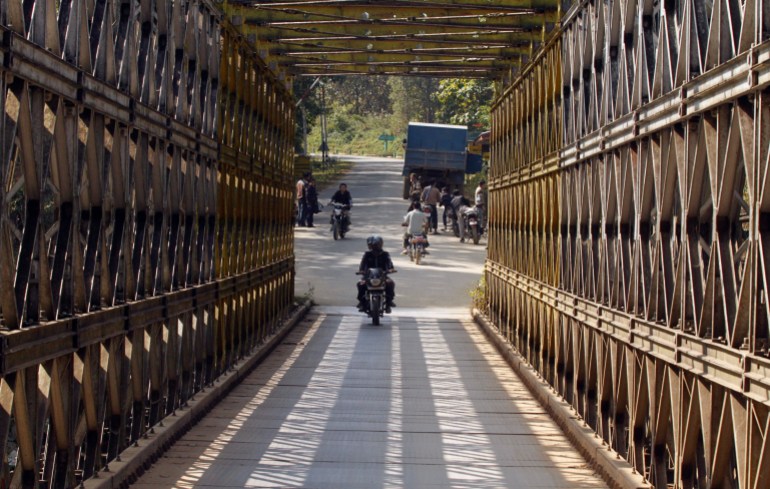
What is audacious is Manipur has one of the largest presence of paramilitary forces, the army and intelligence in the country.
When asked if suspicions over security personnel being involved in the drug trade could be true, Himalay Singh said, “I can’t rule out any individual.”
The retired police officer, too, said, “Moreh [an Indo-Myanmar border town] has been a critical point of smuggling, extortion or loot by security forces.”
Al Jazeera couldn’t verify this independently. But, back in 2022, a Manipur policeman and an Assam Rifles soldier were arrested in Guwahati with banned Yaba tablets worth 200 billion rupees ($2.4bn). According to news reports at the time, the consignment was being smuggled from Moreh.
While it is unclear if any disequilibrium in the drug trade could have led to the crisis, the first part of this series looked at the immediate causes of the conflict based on a presentation by the Assam Rifles on the Manipur conflict.
In fact, Moreh has come to be the most recent flashpoint in the conflict between the Meitei and Kuki-Zo communities with intermittent fighting taking place there since the end of December. This took a drastic turn on January 17 with a 20-hour gunfight ensuing between Kuki fighters and the Manipur police commandos.
In February, India scrapped the Indo–Myanmar Free Movement Regime (FMR) where residents within 16km (10 miles) of the border had been allowed to cross without a visa, using just a border pass, a move vehemently opposed by the local Kuki-Zo and Naga groups.
With accusations against him petering off, Biren in 2022 claimed again his war on drugs was going well. In January 2022, in a post on X, the chief minister said the government had destroyed 110 acres (about 45 hectares) of poppy cultivation in the hills.
A year later when the conflict began in May 2023, several Meitei civil society organisations gave the drug trade a communal colour by claiming that drug running was largely the business of the Kuki community. On social media, the Kuki community at large was targeted as “Narco Terrorists”. The trope caught on.
Meanwhile, the rift between his party’s elected representatives in the state assembly from the Kuki and Meitei communities came out in the open. The Kuki political leaders accused the chief minister of communalising the state and targeting their community by supporting new Meitei armed groups, Arambai Tenggol and Meitei Leepun.
These were the same MLAs who, with the overt support of the Kuki armed groups, had backed Chief Minister Singh in 2022.
“They are part and parcel of tribal politics. If someone wants to fight elections, you need to have their blessing. After the candidates they sponsor get elected, they [the armed groups] get different contracts [from the government],” said a political observer in the state who declined to be named because of concerns for his safety.
As the ethnic conflict intensifies, both rebel groups and political leaders from the Kuki community, who once allied with the Meitei chief minister, are now visibly distancing themselves.
Unlike the 2019 general elections when it fielded a Kuki-Zo, this time the BJP does not have a candidate for the Outer Manipur seat, which covers the hill districts. But in its campaign for the Inner Manipur (valley) seat, it says its focus is on saving the “indigenous people of Manipur” by fencing the Indo-Myanmar border, ending the Free Movement Regime, the “identification of illegal immigrants”, among other issues that have played into the conflict so far.
Demand for a separate state
Despite holding Biren Singh responsible for the ethnic conflict, Kuki leaders within the BJP have not yet resigned either from his cabinet or the party.
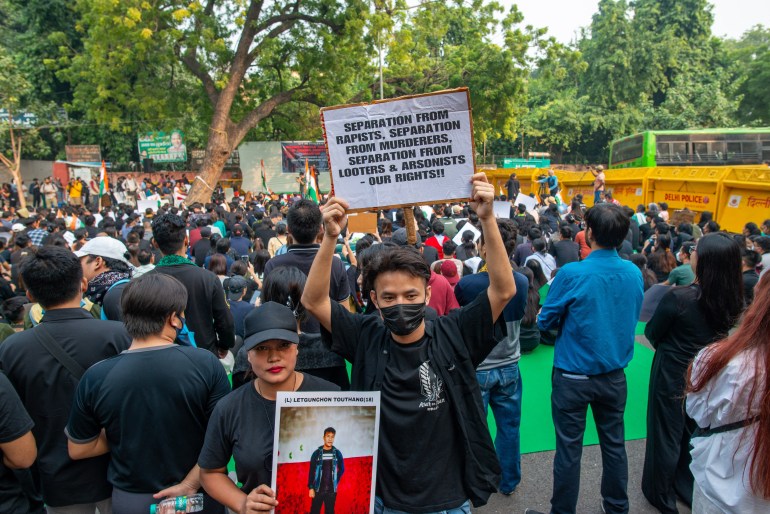
During this period, various Kuki-Zo civil society groups have emerged as prominent advocates for their community’s rights and demands. One of the key demands these groups have consistently rallied around since the onset of the conflict is the establishment of a separate administration, cleaved out of Manipur. This proposition was initially put forth by 10 Kuki-Zo MLAs, seven of whom belong to the BJP.
“Unfortunately, they [the Centre] have been trying to play it down and my reading is that they have been trying or are really buying into Biren [Singh]’s narrative,” said a Kuki-Zo legislator who didn’t wish to be named.
When asked if they planned to resign from the party, the MLA said, “If today I resign from the BJP, the party … will disqualify me from the assembly,” he said, adding, “The majoritarian government is interested in making most or some of the BJP’s members resign and conduct a by-election.”
Considering the anger against the Meitei community, and particularly against Biren Singh, it seems impossible for a candidate endorsed by the state chief minister to win a by-election in the Kuki-dominated hills.
But the MLA hinted otherwise. “Our people being tribals, if there is a by-election they will have a field day splitting people along party lines. That is what they wanted and that has been how politics has been played in India.”
In the upcoming elections, no Kuki-Zo candidates are contesting. All the candidates in the fray for the Outer Manipur seat are Naga with the BJP backing the Naga People’s Front candidate.
The layers of Manipur politics, the linkages between the political elite and their interests across ethnic divides, defy a simpler image of a clash between two communities.
Gun-toting men, young and old, now sit and guard their villages from the neighbouring Kuki and Meitei villages. Every few days, there are headlines on gunfire exchanges and deaths.
According to a retired police officer, who is familiar with intelligence gathering in India’s northeastern states, this kind of “low-grade violence is more dangerous”.
“These are indications that people are being recruited and trained,” he said. Asked what this conflict would spell for the illicit drug trade, he said, “In times of instability, trans-shipment and running becomes more active.”
“The Meiteis can’t go to the hills, and the Kukis can’t come to the valley. But the drugs can still go everywhere,” said Jogesh of the 3.5 Collective.
Angana Chakrabarti is an associate member of The Reporters’ Collective.
Read More: World News | Entertainment News | Celeb News
Aljazera

